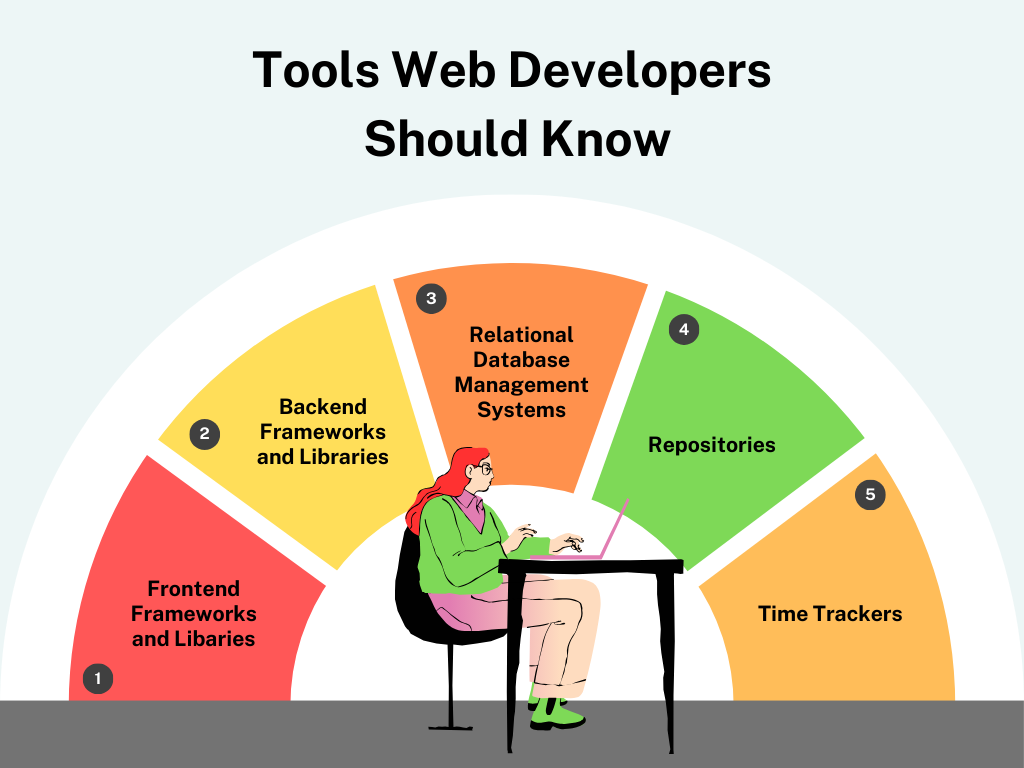The right web developer tools are crucial in software development. These tools accompany developers in various aspects of work: frontend development, backend development, writing, editing, saving code, and work tracking. Frameworks, libraries, and other tools include options for convenient collaboration and ensure the protection of their code. Moreover, some of these tools (for example, libraries and frameworks) are easy and simple to learn, simplifying the work of the developers in the future.
In our article, we’ll take a look at the most important front-end and back-end technologies used in modern web development, and consider their importance and impact on the development process.
Essential Web Developer Tools Every Pro Should Know
Top Frontend Tools
As a rule, every web solution consists of a front end and a back end. Let’s start with the front end. During new web project development, experts try to develop a frontend that would be not only visually pleasing but also as convenient and intuitive as possible for the user. In short, some of the most relevant frontend frameworks are Vue.js, React, Bootstrap, Tailwind CSS, etc. Each of these frameworks and libraries is intended for project interface development of various scales – from small applications to larger projects that simultaneously process a large amount of data. You can read more about the top frontend technologies that will not lose their relevance this year in one of our previous blog posts.
Our developers actively use the universal and flexible Vue.JS, because it allows you to create a variety of frontends for projects of various scales. Also, with the help of Vue.JS, a developer can quickly get involved in the work and learn to write code thanks to a simple and understandable syntax.
Top Backend Tools
No web project front end works effectively without a well-thought-out back-end, which is responsible for all the main processes behind the scenes. Modern users will willingly use a fast and responsive site or an application with reliable storage of the entered data.
For example, TuneLab specialists mostly turn to PHP-based Laravel. The lion’s share of the project was created precisely based on this backend framework because Laravel meets all modern requirements for creating a backend. It provides high page loading speed, a high level of data protection, built-in PHP Unit testing mechanisms, etc. You can read more about Laravel, its advantages, and features here.

Exploring MySQL and PostgreSQL
Databases and tools that allow you to manage these databases play an equally key role in the successful operation of a web application. For this, our developers actively use MySQL and PostgreSQL. Both systems are open source, but each of them has its characteristics. MySQL is primarily popular among developers due to its high speed and reliability. This tool allows multiple users to access the database at the same time without blocking problems, as well as efficiently wrap geodata. This database management system was created by TsX specifically for large companies and for processing a large amount of data. Thanks to the above advantages, MySQL has found its wide application in the creation of a considerable number of sites, applications, platforms, etc. Unlike the previous tool, PostgreSQL does not have the support of a large company and is the brainchild of many people who actively support it and constantly introduce updates. So, this data management system is known for its flexibility, openness to customization (ie, defining your data type and scale), and geodata support. In web development, a database management system plays the following roles:- Data storage. Management systems help developers create databases that allow them to store structured data in the format of tables about the company’s activities. This structured data includes information about users, products, orders, etc.
- Wide functionality. Data management systems include a wide range of tools for developing databases. This includes tools for creating design features, navigating the database, maintaining the speed of processing this data, etc.
- Data security. MySQL and PostgreSQL allow developers to set access rights to information. Providing access to different levels to platform users and administrators ensures a higher level of data security and protection against unwanted intrusions.
- Data accuracy. Proceeding from the previous point, MySQL and PostgreSQL database management systems allow developers to protect data and provide mechanisms for correct data entry into the system.

Must-Have Repository Tools for Web Developers
Repositories are another key component of a developer writing code for a new web solution. A repository is a server created to store software and the data associated with it. Files in the repository can be uploaded and saved in almost any format and are available for download. Among the most popular repositories, GitHub, GitLab, and Bitbucket are usually singled out. Both have common features: a wide range of functionality, options for optimal collaboration of the development team in real-time, and a good platform for improving your web projects.
GitHub
First launched in 2008, GitHub is considered to be the most popular platform that stores the basic data of thousands of the most popular web solutions. GitHub is built on the Git control system. This platform is popular among developers because it provides a wide set of tools for collaborative work on projects, including tracking and solving system bugs, a task management system, and more.
Bitbucket
Bitbucket is a Git-based web platform for code hosting and team collaboration. It is considered the best platform for creating the same space for the developer team because Bitbucket can easily integrate with Jira and Trello. Also, employees have the ability to work on code from the moment an idea is born to uploading that code to a cloud storage that ensures that code is securely protected.
In addition, Bitbucket includes options to automate the collection, deployment and testing of code using the built-in Bitbucket Pipelines continuous delivery pipelines.
GitLab
This is another open-source web tool that you can use to store your web development work. The system’s working principles are similar to GitHub or Bitbucket, but GitLab can be uploaded to your server. Among the advantages of GitLab, they also note it includes AI-powered workflows GitLab Duo, which help to boost and speed up the workflow on the project.
Usually, this web tool is popular among large companies that are worried about possible information leakage and do not want to store code on a third-party cloud service.
Time-Tracking and Work Management Tools for Web Developers
Web developers use various apps and platforms that manage their work and track their working time. As a rule, the project manager appoints the main work plan, the developers, designers, and testers themselves. They approve the work plan, which is written in Jira. Tasks and responsibilities are assigned to specific developers, and they can use a Kanban board to mark the progress of tasks. This also facilitates the work of the project manager, who checks the quantity and quality of the work performed during the sprint.
A project manager can track and do the number of working hours spent by the web developer, then for those who directly create web solutions, there are time trackers like Upwork and WebWork. This is because when using Agile and Scrum methodology, the best method of evaluating an employee’s pay is hourly pay.
The quality of the finished web project is primarily due to the qualifications of web developers and sophisticated project management. However, choosing the right tools and technologies plays an important role in the quality and performance of web applications. In particular, it’s also about creating a modern and intuitive frontend and an efficient and secure backend. The right tools selection for creating databases is also important for web development. Last but not least, Upwork and WebWork are needed for the effective work of the developer on web solutions, which track the developer’s working time and let the project manager know about the employee’s productivity on the project.
The combination of these above tools ensures the creation of a successful web project that will satisfy the client’s business needs and be convenient for all users.


